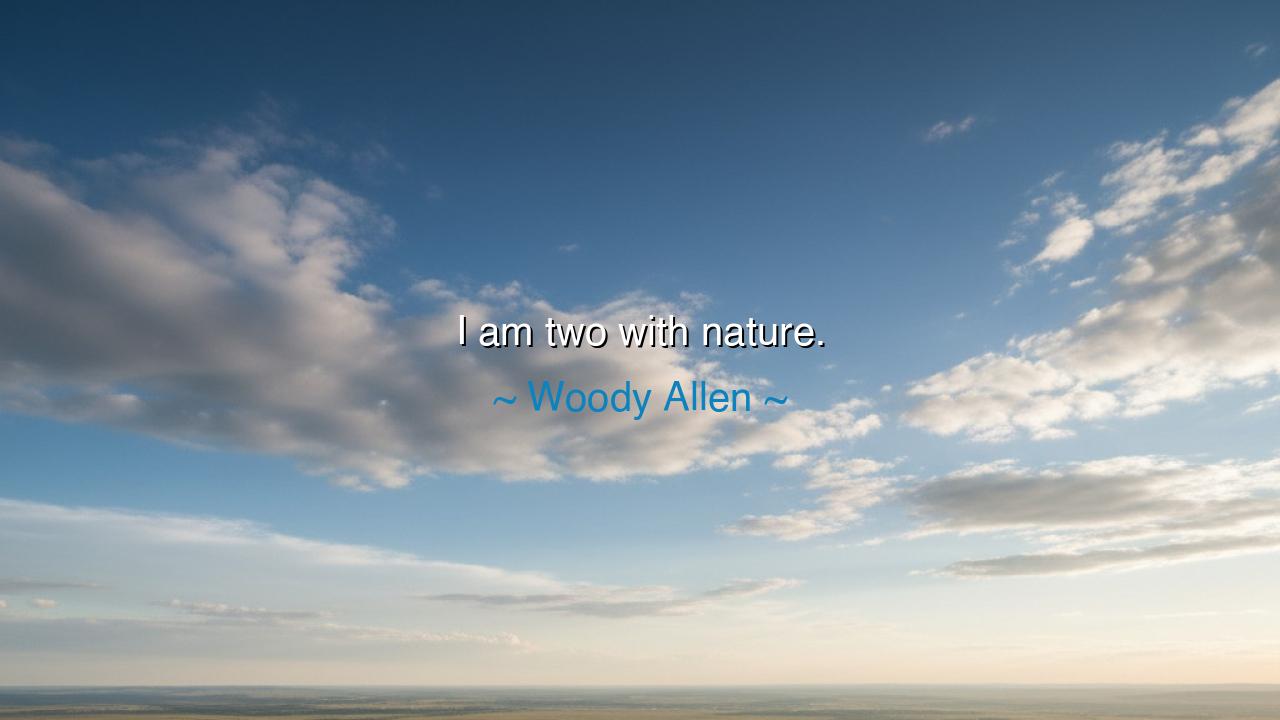
I am two with nature.






Hear the jesting voice of Woody Allen, who with sharp wit declared: “I am two with nature.” At first these words seem light, a playful twist upon the ancient saying, “I am at one with nature.” Yet beneath the veil of humor lies a truth profound, for Allen’s paradox reveals the rift of modern man: though born of the earth, we feel divided from her; though dependent on her, we often live as strangers in her house. His jest is confession, and his confession is prophecy—that humanity, for all its wisdom, has grown apart from the very source of its life.
The origin of this saying lies in the ancient dream of harmony. To be “at one with nature” has been the goal of sages and poets since time began. The hermits of India sought it in the forests, the philosophers of Greece in their meditations, the tribes of the earth in their dances and rituals. But Allen, child of the modern city, clothed in electricity and steel, confesses with irony that he is instead “two with nature”—not united, but divided, uneasy, estranged. The laughter his words provoke is edged with sorrow, for we see ourselves within them.
Consider the story of Diogenes, the Cynic of Greece. He rejected the comforts of Athens and chose instead to dwell in a barrel, walking barefoot, living close to the earth. To him, society was corruption, and only by aligning with nature could man be free. Yet how few could follow him! Most, like Allen centuries later, feel not one but two—torn between the simplicity of nature and the complexity of civilization. The struggle between unity and estrangement is as old as mankind itself.
History gives us another witness in the life of Henry David Thoreau. He fled to Walden Pond to live deliberately, to be at one with the woods and waters. Yet even Thoreau returned often to the village, seeking bread, companionship, and talk. His own journals confess the paradox: that man desires unity with nature, but is pulled constantly by society. Thus Allen’s joke is in truth the cry of the human condition—we strive for oneness, but often find ourselves divided, “two with nature” instead of one.
The meaning of the saying is this: man must confront his distance from nature, not to despair, but to awaken. The humor breaks open the truth—that we are estranged from the earth, yet we long for reconciliation. To confess, “I am two with nature,” is to admit our incompleteness, and perhaps to stir within us the desire to heal the division. The joke becomes wisdom, for it is through acknowledging our separation that we may begin the journey back to wholeness.
O children of tomorrow, learn from this. Do not laugh only, but reflect. Ask yourselves: are you at one with nature, or are you two? Do you walk lightly upon the earth, or do you tread as stranger and conqueror? To be one with nature is to breathe with her rhythms, to eat with gratitude, to respect her balance. To be two is to live in discord, blind to the source of your own life. The choice is yours, each day, in how you live, consume, and dwell upon this earth.
Therefore, let your practice be this: step outside often, and let the wind be your teacher. Grow something with your hands, even if only a flower in a pot. Walk upon the soil with reverence. Listen to the song of birds, and remember they ask nothing of you but respect. In these small acts, you close the distance; you become less two, and more one.
Thus Woody Allen’s jest endures as hidden wisdom: “I am two with nature.” Laugh, yes—but also let the laughter be a mirror. For within the paradox lies a call: to turn estrangement into reunion, to walk once more in harmony, until we may truly say not “I am two,” but “I am one with nature.”






AAdministratorAdministrator
Welcome, honored guests. Please leave a comment, we will respond soon